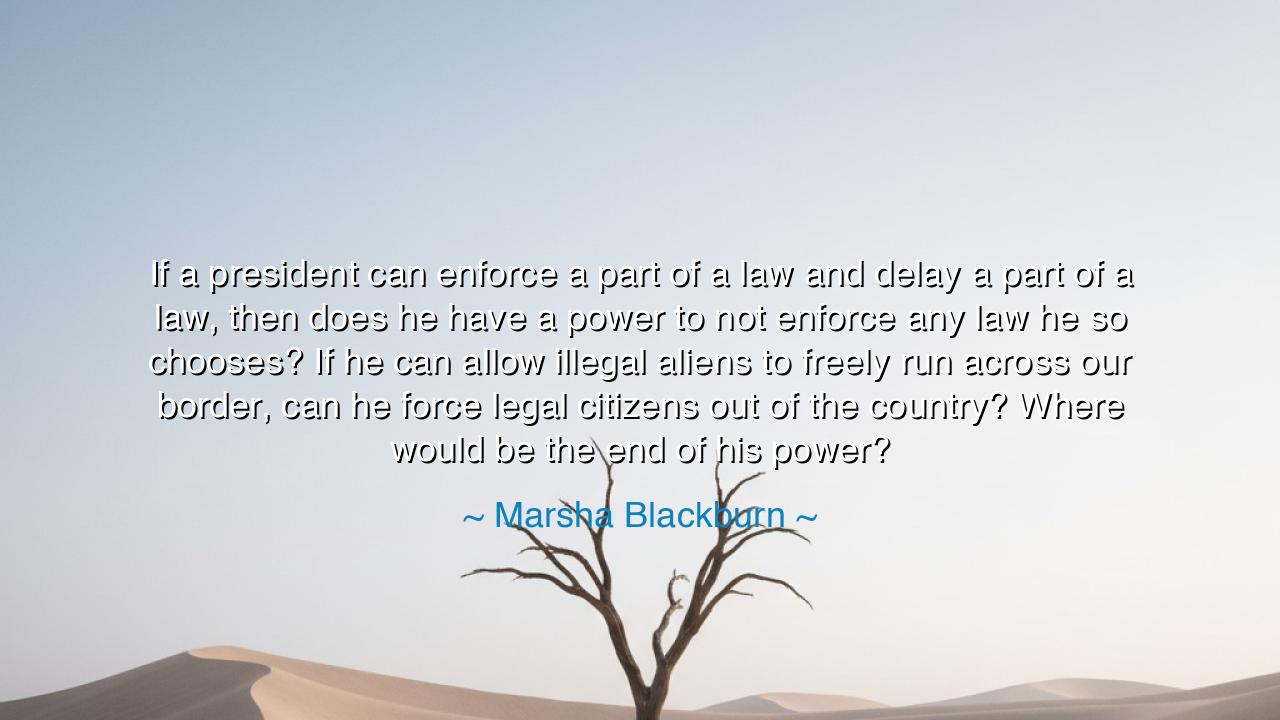
If a president can enforce a part of a law and delay a part of a
If a president can enforce a part of a law and delay a part of a law, then does he have a power to not enforce any law he so chooses? If he can allow illegal aliens to freely run across our border, can he force legal citizens out of the country? Where would be the end of his power?






Hearken, O seekers of wisdom, to the words of Marsha Blackburn, who, observing the delicate balance of power in the governance of men, asked with piercing clarity: "If a president can enforce a part of a law and delay a part of a law, then does he have the power to not enforce any law he so chooses? If he can allow illegal aliens to freely cross our border, can he force legal citizens out of the country? Where would be the end of his power?" In these words lies a meditation on the nature of authority, the limits of sovereignty, and the eternal question of restraint: when power becomes unchecked, what becomes of justice, order, and the common good?
Since the dawn of organized rule, humans have wrestled with the tension between authority and accountability. In the halls of Athens, the orators warned that a leader who could bend law to will could unravel the very fabric of democracy. In Rome, the tribunes and senators debated the imperium of consuls, recognizing that the concentration of power in one hand, unchecked by law, leads inevitably to despotism. Blackburn’s words echo these ancient concerns: if one who wields the highest office can choose selectively which laws to enforce, the foundations of justice tremble beneath the weight of ambition.
Consider the reign of King John of England, whose arbitrary exercise of authority and disregard for established law led to the Magna Carta, a historic affirmation that even sovereigns must be bound by law. Blackburn’s reflection carries this same caution: a leader who enforces some statutes but delays or ignores others risks creating a hierarchy of obedience, where the rule of law is subordinated to the whim of one individual. The end of power, she warns, is not merely theoretical; it manifests in chaos, resentment, and the erosion of civic trust.
In modern times, debates over border enforcement and immigration policy illustrate the stakes Blackburn raises. When certain groups are permitted or excluded at the discretion of executive authority, questions arise: who determines the scope of enforcement, and on what principles? To allow illegal aliens to traverse borders freely while threatening the rights of lawful citizens is a distortion of justice, a destabilization of the social compact. Her words summon the wisdom of the ancients: that authority must be exercised with consistency, transparency, and fidelity to the law itself, not according to caprice.
Yet her reflection is not merely political; it is a universal meditation on responsibility. In every domain, from governance to personal life, the temptation to bend rules for convenience or desire can corrupt integrity. The ancient philosophers spoke often of moderation and limits: a leader, a parent, a merchant, or a judge who selectively applies rules wields power that, untempered, becomes tyranny. Blackburn’s question is a moral challenge: recognize the perils inherent when discretion is divorced from principle.
The lesson, therefore, is as timeless as it is urgent: power without accountability, discretion without principle, is the seed of injustice. Citizens must remain vigilant, institutions must safeguard against overreach, and leaders must submit to the enduring authority of law. The life of the polity, like the life of the individual, depends upon the careful calibration of authority, guided by reason, conscience, and the collective wisdom of the governed.
O seekers of wisdom, take Blackburn’s warning into your own hearts: question authority, understand the limits of power, and ensure that your actions, and those of your leaders, are bounded by principle. In every choice, in every exercise of discretion, ask whether law governs or whim prevails. By cultivating vigilance, discernment, and courage, one preserves the integrity of society and the liberty of its citizens, echoing the lessons of Athens, Rome, and all who have safeguarded justice through the ages.
Take this teaching into daily life: honor the rule of law, resist the seduction of arbitrary power, and hold both yourself and leaders accountable. Recognize that selective enforcement, unchecked discretion, or the bending of rules for personal or political gain is a path to chaos. In clarity, courage, and adherence to principle lies the enduring strength of civilization, the safeguard of freedom, and the moral legacy of generations past and yet to come.






AAdministratorAdministrator
Welcome, honored guests. Please leave a comment, we will respond soon